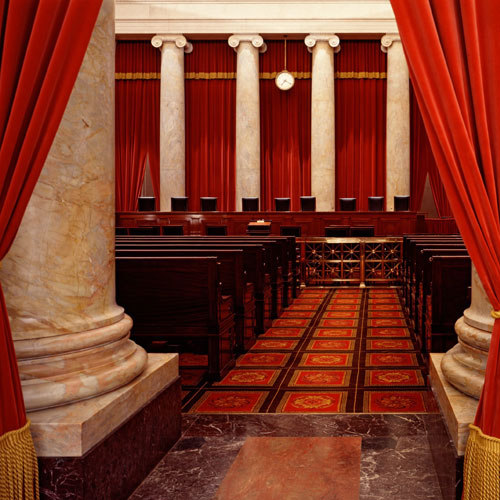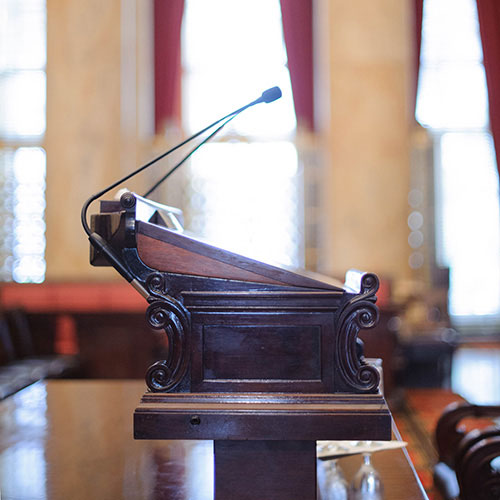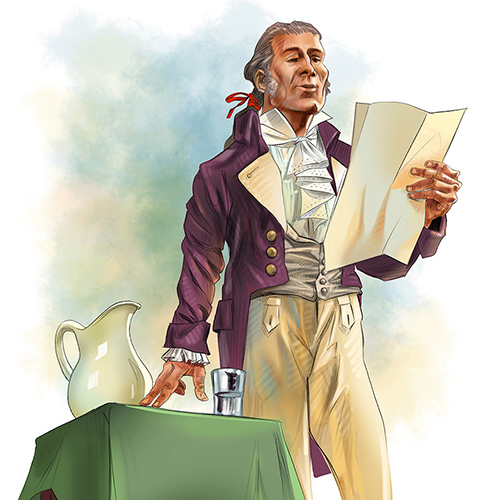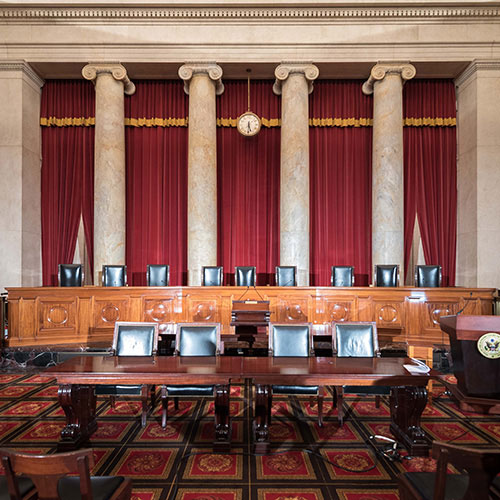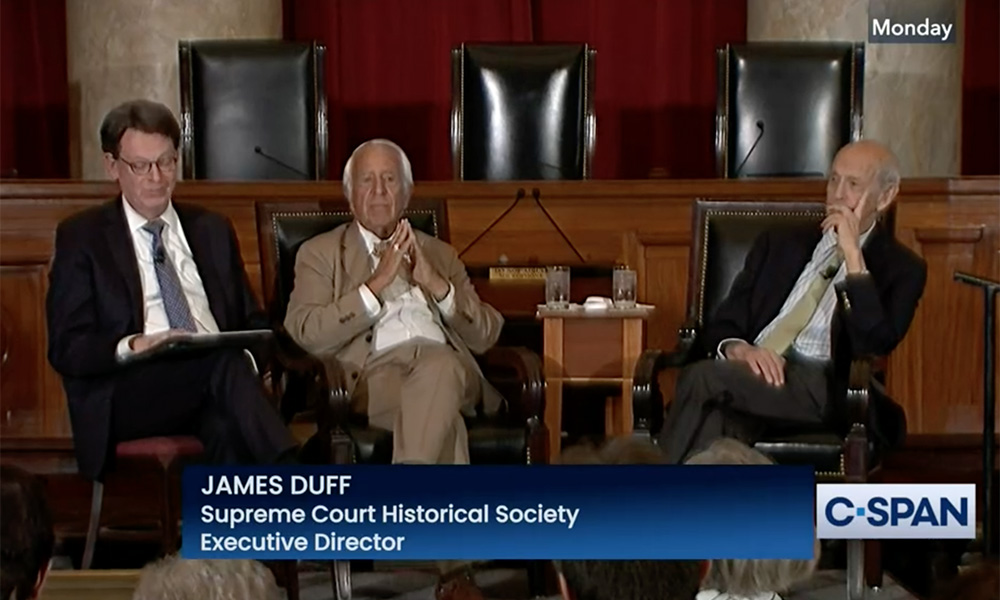Retired U.S. Supreme Court Justice Stephen Breyer and his brother, federal Judge Charles Breyer, discussed their San Francisco upbringing and legal careers with the Supreme Court Historical Society. The conversation took place inside the Supreme Court’s courtroom, where official oral arguments are conducted.
Associate Justice Stephen G. Breyer (Ret.) and his brother, Senior Judge Charles R. Breyer from the U.S. District Court in the Northern District of California, treated Society members to a very special Annual Lecture in the Courtroom of the Supreme Court prior to the Society’s Annual Meeting and Dinner in the Great Hall of the Supreme Court on June 5, 2023. The occasion marked the Society’s first return to the Court for its events since the pandemic. Both Justice Breyer and Judge Breyer extolled the importance and value of the Society’s work in their remarks. Inspired by a recent trip to Athens, Greece during which he viewed the remains of the Acropolis and the Pantheon from 2500 years ago, Justice Breyer began his comments by observing how important the study of history is in preserving our democracy and thanking the Society for its work in educating our citizens, and our children in particular, about the Court and its history, “both good and bad.” He recognized the Society’s work in this regard, noting that “there are few organizations as important in the law.”
The discussion was an informative and entertaining review of the Breyers’ upbringing in San Francisco, their formative years, their mentors, their commitment to public service (a combined 68 years of service on the bench alone), and the way they worked in a civil manner with their colleagues. The discussion was moderated by the Society’s Executive Director Jim Duff who noted the fitting setting of the Courtroom for the discussion both as the forum for much of Justice Breyer’s important work and for Judge Breyer’s receipt of the Judiciary’s prestigious Devitt Award in 2018. The lecture was entitled “Lessons in Civility” and it lived up to its billing.
Judge Breyer began his comments with an historic “reveal.” He brought with him a family treasure which surely will become a national treasure — a copy of their mother Anna’s letter to her brother, Leo Roberts, from 80 years ago in 1943 about her two children: Stephen, age 5, and Chuck, age 2. Each took turns reading excerpts about the other from the letter. Judge Breyer read that 5-year-old “Steve is a wonderful little fellow, Leo. Extremely intelligent…he’s a great help to me. He makes his own bed and, of course, completely independent as far as bathing and dressing is concerned…He is like another pair of legs for me as he does all of my errands around the house…You can converse with him as you would with an adult…He has a tremendous vocabulary and most people when they talk to him think he is 8 or 9 and small for his age…”
Justice Breyer then read from the letter about Chuck, which was an honest and candid assessment but perhaps less flattering given Chuck’s age – the “terrible twos.” “…That Chuckie,” it said, “What a guy!… Any attempt to discipline means nothing…he is like a stick of dynamite. Headstrong, will like iron combined with a marvelous sense of humor…When he is up to his shenanigans you get so mad but you have to laugh…A day doesn’t go by that he doesn’t get himself into some kind of trouble….” The audience was highly entertained, and we think you will be, too. You may view the entire discussion on C-Span by clicking here.
Two among the many other highlights in their discussion were their recollections of their father’s friendship with Ernest Besig, the attorney for Fred Korematsu. Justice Breyer described the history of Korematsu v. United States, the challenge to internment of Japanese Americans during World War II, and the atmosphere in San Francisco at the time. Here again, Justice Breyer noted the importance of the Society’s work in civic education, and especially that case: “It would be interesting to know that history, wouldn’t it? Not just interesting but important for the Court and important for the country to keep charge of it, and that’s why you support this institution. Thank you very much.”
Additionally, the Breyers spoke about their military background and the influence it had on their viewpoints and careers. Both served in the Army Reserves. Judge Breyer greatly valued the exposure the military gave him to work side-by-side on a common cause with people he otherwise had no contact with in his daily life, people who were less fortunate than he had been and were not as privileged as he had been. He noted that he gained insight into what America is all about from this experience.
Similarly, Justice Breyer recalled the feelings he had when visiting the Battle of the Bulge site in Northern France and seeing grave markers of those who had sacrificed their lives so others could have a better life. He summarized his experience by observing that “we’re in this together so we better start getting along. That’s the Armed Forces. It brings that sentiment. And you keep it.”
It was clear from the lecture that the Breyers have not only “kept” that sentiment. They have shared it. Their civil discourse and their commitment to civic education has been an inspiration to many Americans, and the Society is grateful that they used our Annual Lecture as a forum to advance those just endeavors.
* * *
The Annual Lecture began in 1978, four years after the founding of the Society. Professor Richard Morris delivered the first lecture in the Restored Supreme Court Chamber in the Capitol Building. Since then, the Society has been honored with lectures by future Supreme Court Justices, including John G. Roberts, Jr. and Antonin Scalia; by sitting Justices, including Chief Justice William H. Rehnquist, Justice Stephen Breyer, Justice Ruth Bader Ginsburg, Justice Anthony Kennedy, and Justice Samuel A. Alito; and by retired Justices, including Harry A. Blackmun. Justice Breyer delivered the Annual Lecture three times while he was a sitting Justice.
